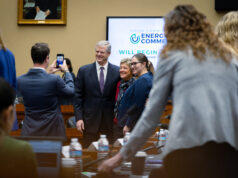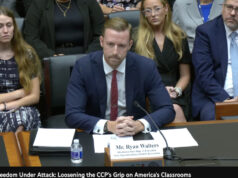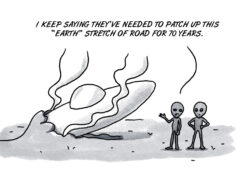
In the fall of 2019, the journalist David Corn wrote in Mother Jones about a mental health crisis among climate scientists, who face “the constant background of doom and gloom of science.” He cited a filmmaker, Christine Arena, who learned about researchers, “There’s deep grief and anxiety for what’s being lost, followed by rage at continued political inaction, and finally hope that we can indeed solve this challenge. (…) They are on the front lines of contending with the fear, anger, and perhaps even panic the rest of us will have to deal with.”
Climate science has not always been such a deeply doom-and-gloom subject. Fifty years ago this week, on April 22, 1970, nearly 10 percent of Americans turned out for the first annual Earth Day. The event was a cross-generational, multicultural effort to clean the air and water, ban DDT, save the whales, halt offshore drilling and remove lead from paint and gasoline.
At the time, there was also the hope of a bipartisan, cross-sector effort to head off climate change. As Nathaniel Rich documented two years ago in the New York Times Magazine, in 1965 a Science Advisory Committee executive report on carbon dioxide “warned of the rapid melting of Antarctica, rising seas, (and) increased acidity of fresh waters.”
No coordinated global effort was immediately undertaken, and emissions continued to rise into the 1970s. But in the next decade or so, there were promising congressional responses. In 1987, Sen. Joe Biden introduced legislation to establish a national climate-change strategy. In 1988, there were 32 climate-related bills introduced in Congress, and eventually Sen. Timothy Wirth led the way to the omnibus Energy Policy Act of 1992.
Before 1989, Rich wrote, “Some of the largest oil companies, including Exxon and Shell, made good-faith efforts to understand the scope of the crisis and grapple with possible solutions.” Rich cited an Exxon 1978 internal memo warning that “humankind had only five to 10 years before policy action would be necessary.”
Alarmed by the anti-environmentalism of President Ronald Reagan and his appointees, such as James Watt and Anne Gorsuch, many Republicans helped lead the battle against climate change. They successfully sought the assistance of Exxon, believing it was “less ideologically blinkered than the Reagan administration,” according to Rich. There was reason to think Exxon would prepare for the future by investing in renewable energy.
After 1989, however, industry leaders shifted gears, began ignoring their own scientists, and abandoned the fight. Instead, energy companies “coordinated efforts to bewilder the public” and downplayed the global threat, Rich wrote. Just two years after Exxon had boasted about its commitment to renewable energy, the company reverted to its focus on hydrocarbons.
Now, Rich wrote, quoting a paper from Nature, climate models predict that “the toughest emissions reductions now being proposed, even by the most committed nations, will probably fail to achieve ‘any given global temperature stabilization target.’”
Earth Day plods on
That Nature paper was co-authored by Ken Caldeira, a climate scientist at the Carnegie Institute for Science who was on the Nobel Prize-winning International Panel on Climate Change team. (Caldeira also happens to be an old friend of mine.)
Asked in David Corn’s article about how he deals with the emotional effects of the environmental devastation he sees in his work, Caldeira said, “I plod on” and added that, as a scientist, he believed “my only role is to generate useful information.”
“Maybe I’ve become better at suppressing my feelings,” my friend told Corn, “But my dominant strategy is to intellectualize it and say, ‘What a crazy species we are.’”
We are currently in the middle of another crisis — the coronavirus pandemic — that has shown us all too starkly the consequences of not heeding the warnings of science. As with climate change, we’ve long known that pandemics like this one were inevitable, and yet we are suffering the consequences of unforced errors and dismantled public-health institutions.
If there is any good to come out of this current situation, perhaps it will be the lesson that we must act decisively and quickly to head off the larger global catastrophe we are facing. And perhaps it will give us the vision and determination required to enact needed changes.
Unless we adopt some sort of Green New Deal, which combines the lessons learned from the Great Depression with modern science, it’s hard to imagine a non-tragic ending to today’s climate crisis. Until recently, it’s been hard to believe that those comprehensive policies would be doable.
As Eric Klinenberg recently wrote in the New York Review of Books, for years “governments ignored scientists’ urgent pleas to develop a coronavirus vaccine and a stronger global preparedness plan.” Now, as we struggle “to survive one preventable emergency,” we “can see more easily the cost of inaction.”
Today’s younger generation should be able to see, even clearer than my generation did on that first Earth Day 50 years ago, that we no longer have the time to ignore the unassailable facts of viruses or carbon-based fuels. We must have serious cross-generational conversations about the useful information science has given us. We must take to heart the lessons our crazy species needs to learn. And we must act on them.





















